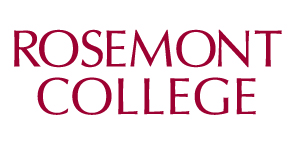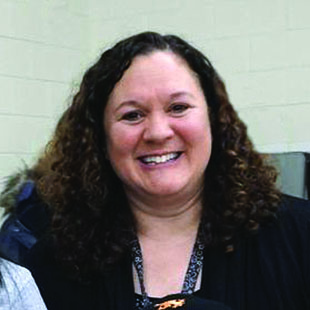MA in Education
 Advance Your Credentials, Advance Your Career
Advance Your Credentials, Advance Your Career
The profession of education is often described as a calling. With a rigorous and comprehensive curriculum, the Rosemont College MA in Education provides you with the expertise needed to make a real difference as an educational leader. Typically available to teachers, the degree is also open to other individuals who want to earn a graduate degree credential in education.
Applying is Straightforward and Free
Rosemont has been supporting students like you to advance their lives, and those of their families, through education since 1921. We believe a quality education should be affordable and attainable, and our application process reflects this. Applying is easy, and free. And we’ll only need a few supporting documents to make sure Rosemont is the best fit for you. Click here to learn about how to apply and associated requirements.
A Comprehensive Curriculum Taught by Experts in the Education Field
Rosemont graduate education professors are leading experts in the field, making extraordinary contributions to school administration, teaching, literacy, leadership, ESL programming, and more. Learn more about the program faculty.
The MA in Education is a 30-credit (three-semester) program that is approved by the Pennsylvania Department of Education. Coursework is delivered in a traditional 14-week-semester format.
Technology has become a key component in the classroom today and it is imperative that teachers have a solid understanding of how best to utilize this important tool. Students in this course will explore the effective use of technology in the K-12 classroom environment, covering a wide variety of educational applications and websites.
The course will also address the use of technology to facilitate differentiation, critical thinking and problem solving; developing media and information literacy skills; effective use of the internet for information, communication and collaboration; policies and procedures; and current issues and trends in the field. The format of the course will be a combination of virtual and live discussion and collaboration as well as hands-on lab time. (3 credits)
The focus of this course will be the teacher’s role in establishing an academic field of study through which English Language Learners (ELL) are instructed in social, cultural, and academic language skills to improve her/his school performance. Instruction involves the teaching of listening, speaking, reading, and writing at appropriate developmental and proficiency levels with little or no use of the native language.
Classroom and ESL teachers are expected to collaborate for the delivery of an effective learning experience utilizing various assignments, lesson plans, projects, assessments and/or field work. All grade levels (K-12) are discussed, but for these specific certification curriculum purposes, the PK-4 broad ban will be specified in all assignments and activities. (3 credits)
This course examines contemporary issues in education, including the political and social influences on schools. Students will examine relevant educational policy on the local, state, and national levels and the risk factors that many students must overcome to succeed in the classroom.
Trends in curriculum, instruction, and assessment will be analyzed as students reflect on the research and best practices that contribute to effective schools, teaching and student learning. (3 credits)
This course addresses the relationships among three fundamental aspects of the educational process: the subject matter of the curriculum, the diverse abilities of students, and the teacher’s responsibilities to design and implement instruction.
Behavioral, social cognitive, developmental, neuropsychological, and constructivist learning theories that address pedagogy, student achievement and diversity, motivation, and assessment will be examined. (3 credits)
The increase in ethnic diversity has caused many educators to expand their knowledge of multicultural education in schools. Students in this course will study the process that creates a culturally responsive classroom to embrace and maximize student diversity in a positive manner which increases academic achievement.
They will develop the attitudes, knowledge, and skills to work effectively in schools that are diverse in terms of race, ethnicity, gender, ability, language, socioeconomics, and family configurations. Furthermore, students will work together to gain theoretical and practical knowledge and resources applicable in any K-12 setting. (3 credits)
This course examines curriculum, instruction and assessment in the context of standards-based education. It provides school leaders with the ability to understand major curriculum design models, interpret school district curricula, initiate needs analyses, plan and implement a framework for aligning curriculum, instruction, and assessment.
Standards and benchmarks, state and national influence, and curriculum assessments will be examined. Emphasis is given to providing knowledge and skills that will enhance pedagogy, effective school and classroom leadership, and creating a culture that supports learning. (3 credits)
Participants in this course will engage in explorations of action research in theory and practice in relation to serving as an administrator or teacher in their school. Students will make connections between their theoretical understandings of research and their own emergence as practitioner researchers in educational settings.
Participants will view themselves as producers of knowledge who can learn more about administration or instruction by studying their own experiences to improve school effectiveness and student learning. They will have an opportunity to identify a problem in their school, or practice, devise a plan, gather and analyze data, report results and develop implications for their future administrative or teaching practices and action research. (3 credits)
This course is intended to provide the teacher candidate with an in-depth understanding of laws and legal cases that determine current practices in the field of special education. In addition, teacher candidates will review state regulations, state forms, and explore websites providing information and support regarding students / parents / professionals in meeting legal requirements in the education of special needs students.
Professional and educational organizations will be explored parents / professionals in meeting legal requirements in the education of special needs students. Professional and educational organizations will be explored. (3 credits)
This course is designed to explore current research-based instructional strategies and curricular practices that enhance children’s writing. Instruction will integrate technology and writing practice so that teachers can immediately apply, organize, manage, and evaluate a writing curriculum for their classroom that will provide positive results. (3 credits)
This course will introduce students to current best practices in classroom assessment and explore the critical role that assessment plays in the teaching and learning process. Understanding of the use and purpose of formative and summative assessment strategies will be developed, with an emphasis on providing feedback and making adjustments to instructional practices.
The link between assessment and grading will also be discussed. Assessment will also be viewed in light of No Child Left Behind (NCLB) and the emphasis on data-driven decision making and standards-based instruction. Concepts related to assessment and measurement, such as validity, reliability, and other statistical measures will also be explored. (3 credits)
The MA in Education Degree with Thesis Option (10 classes – 3 credits each) is available for students who plan to complete a Doctoral Degree in Education. Students will choose to complete either a qualitative or quantitative thesis. EDU 4545 Research and Statistics course and EDU 4620 Master’s Thesis required.
Look Forward to a Successful Career
Employment in education and training positions is projected to increase 5 percent by 2029, faster than the average for all occupations. In addition to teaching, graduates of Rosemont’s MA in Education will be prepared for a variety of career paths, including:
- Curriculum Developer
- Doctoral Candidate
- Educational Consultant
- Educational Policy Analyst
- Program Director
- Corporate Trainer

 “You get special attention when you study at Rosemont. The professors are the best
I have ever had. They understand most students have full-time jobs, so they are very
flexible, and they have so much experience to pass on. The curriculum is all-encompassing;
everything has a purpose, which is great because I don’t have time for busy work.
I’m 100% prepared for the next step in my career.”
“You get special attention when you study at Rosemont. The professors are the best
I have ever had. They understand most students have full-time jobs, so they are very
flexible, and they have so much experience to pass on. The curriculum is all-encompassing;
everything has a purpose, which is great because I don’t have time for busy work.
I’m 100% prepared for the next step in my career.”